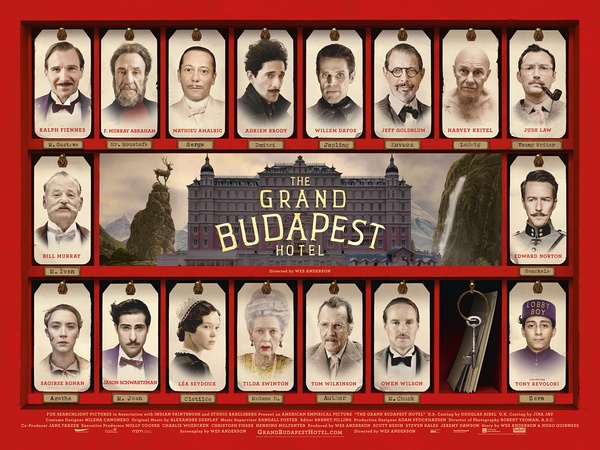
【电影简介】
影片故事发生在20世纪30年代到60年代的欧洲,影片围绕着一位带着传奇般色彩的酒店礼宾员和他的年轻门生展开。在远近闻名、宾客络绎不绝的布达佩斯大饭店里,礼宾员古斯塔夫先生经历了不少声色犬马,其中不乏无价名画的失窃、名门王族望族的财产纷争等荒谬轶事;不仅如此,他还跟这家豪华酒店一齐见证了欧洲半个世纪间的战火硝烟,沧海桑田。
【音频文本】
I've always enjoyed the irresistible charm in movies that reflect a specific period of time: They are a good way to pass down history, sentiments and even techniques--"Grand Budapest Hotel" is one of the best examples.
Based on the works of Austrian novelist Stefan Zweig, the movie tells the story of a hotel concierge at the Grand Budapest Hotel in the fictional Republic of Zubrowka. The popular and well-mannered concierge, Gustave, finds himself implicated in a murder case of his friend and former client, Madam D. During his questto clear his name, he comes across soldiers, prisoners, greedy relatives of the deceased and a quite generous inheritance. The only company he has in this process is the loyal lobby boy of a friend named Zero.
The story may be fictional, but still manages to offer a portrait of Europe before the outbreak of the Second World War. In Zweig's opinion, it was an age when humanity gave way to barbaric slaughtering. In a world marked by increasing military presence and overbearing thuggery, Monsieur Gustave, with his well-trained words, outfit and manners, is the last, but superficial, remainder of European propriety and cultural tradition. Early 20th Century Europe was not the best place to live in, especially for a sensitive artist such as Zweig, who was born in a Jewish family.
Zweig's pessimistic worldview and artistic pride is perfectly translated in the movie by director Wes Anderson, especially in the highly literary narration. It is a great pleasure to listen to proper English, although the lavishly-constructed sentences can be a bit difficult to follow for non-native speakers.
Anderson has done more than just adapting this literary work to the big screen; his bold experiment with the camera is perhaps the most commendable part of this movie. To showcase the story's multiple timelines, the director shot the film in three aspect ratios. And often he has integrated multiple dimensions in one shot, so each picture carries a multitude of messages for viewers to decipher. Meanwhile, the camera is frequently swung around; the movements lend much dynamism and flavor to the comedy.
In such a weirdly comical story, not one actor or actress seems out of place. It is only natural because Anderson had at his command the most talented crew. Ralph Fiennes is the charming Monsieur Gustave, while Tony Revolori plays the clever lobby boy. While the performances delivered by a movie's stars are crucial to its success, even minor characters in The Grand Budapest Hotel are portrayed by big names like Tilda Swinton, Mathieu Amalric and Jeff Goldblum, among others.
Lastly, I'd like to point out that the works of composer Alexandre Desplat, who also wrote the scores for "The Curious Case of Benjamin Button", "Argo" and "The King's Speech". He has just become the first composer to be selected to preside over the jurors at the upcoming Venice Film Festival. Let's hope his good sense in music can be extended to a more visual art form.
轻松调频EZFM 微信mrweekly












